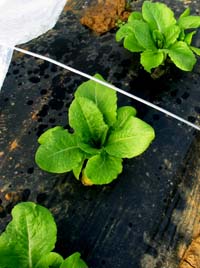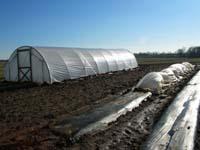Plastic Tunnels Provide Expanded Production Opportunities
Plastic Tunnels Provide Expanded Production Opportunities


It may be the dead of winter, but the crisp green lettuce growing inside the plastic “tunnels” is alive and only days away from the dinner table.
Lettuce, spinach and kale are being grown in a series of experiments at the University of Kentucky Research and Education Center in Princeton and the UK College of Agriculture’s south farm in Lexington.
This project began in Lexington and was expanded to the UKREC to compare the high-tunnel performance at two locations with significant temperature variations. The vegetables were planted on Dec. 10.
The project consists of two raised beds under a high plastic tunnel with another smaller tunnel on one of the raised beds inside the larger tunnel. There are also raised beds outside the large plastic tunnel. One raised bed is uncovered and another is covered only with a small plastic cover similar to that used to keep frost off.
“We are working on season extension for farmers who are phasing out of tobacco and looking for other market opportunities,” said Shane Bogle, UK Extension associate for vegetable production. “This is one way they can extend their season if they are already growing vegetables and get an extra one or two crops.”
At Princeton, the lettuce on raised beds that was not covered has died while the kale and spinach are stunted. With only the low-tunnel cover, the plants have grown very little and mostly sit in a dormant state. On the other hand, the plants inside the high tunnel are actively growing and those under the smaller tunnel within the larger tunnel are actively growing and noticeably larger.
It takes about 60 days for lettuce, kale and spinach to be ready for harvest and, depending on outdoor temperatures, will take at least two weeks longer to mature inside the high-tunnels.
“This can extend a grower’s season and get in some extra revenue when not a lot is going on on the farm,” Bogle said.
The cost is relatively low. The design uses PVC pipe, metal stakes, a small amount of wood and plastic. There are a few farmers in Kentucky utilizing this growing system to extend their seasons.
Insects and diseases are less of a concern since plants are growing in the fall and winter seasons. However, when temperatures warm up in the spring diseases always are a concern, especially with the high humidity inside the plastic structure.
Once the cool season crops are harvested, farmers can then plant peppers or tomatoes under the tunnel to get them off to an early start and roll off the plastic once the outside conditions are warm enough. That moves their marketing date ahead of many other traditional growers.
Homeowners who are interested in gardening also can utilize these structures in their own backyards. The size of the structure is only dependent on the space available.
Working on this project in Lexington are horticulture specialists Brent Rowell, Jack Buxton and graduate student Amanda Ferguson. Working on the project in Princeton are Bogle and horticulture specialist Joe Masabni.
In the fall and winter months cool season crops grow best in a high tunnel system, Masabni said. These crops can tolerate cooler temperatures.
“These can tolerate 20-degree temperatures for a couple of hours before it warms up again whereas for tomatoes a 20-degree temperature for two minutes will kill them,” he said. “But, cool season crops doesn’t mean they only grow best at cool temperatures, it means they tolerate cool temperatures and continue to grow when other crops cease to grow. They still need around 70 degrees to grow best.”
For more information on high tunnel plant production, contact a local office of the UK Cooperative Extension Service.
